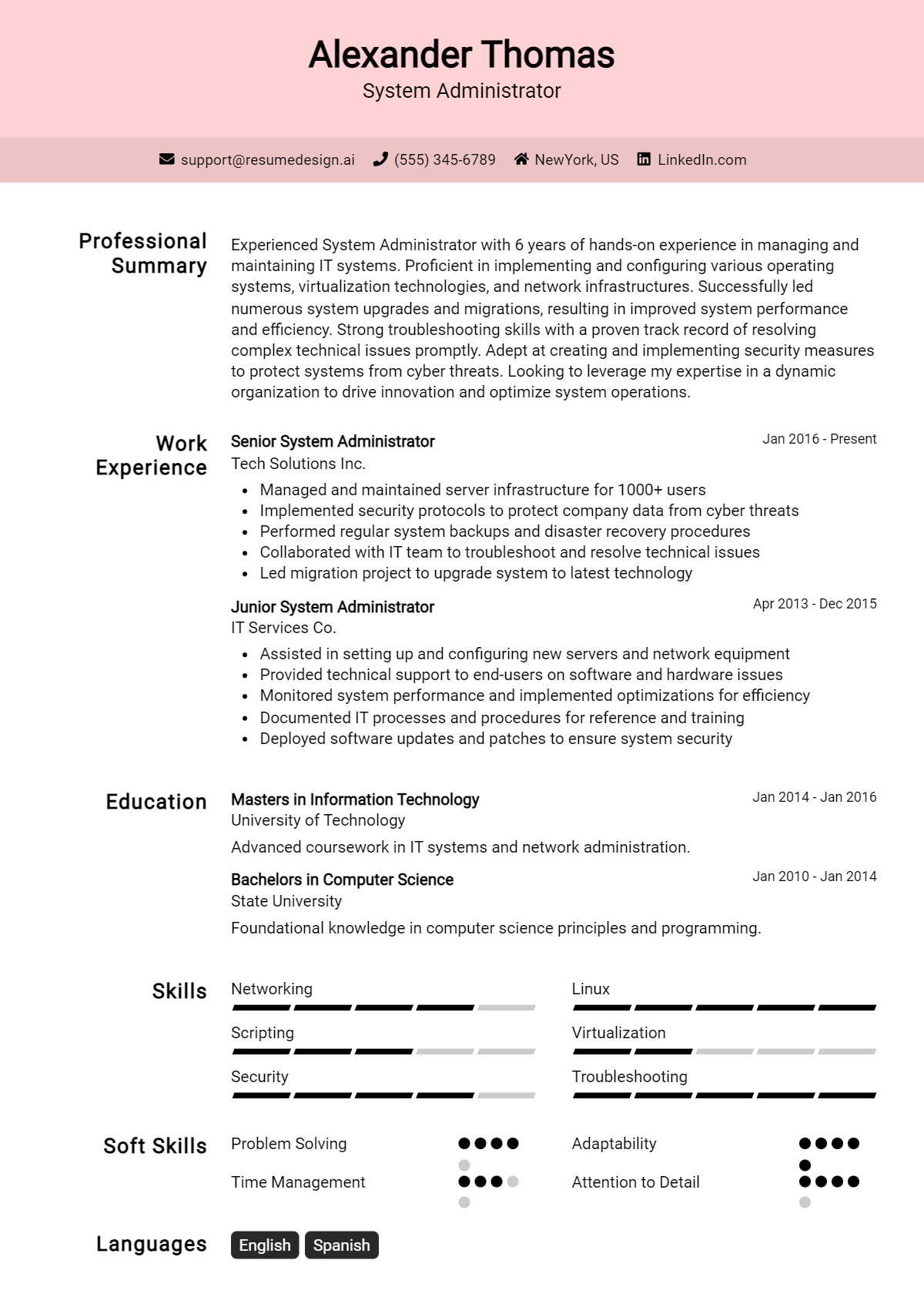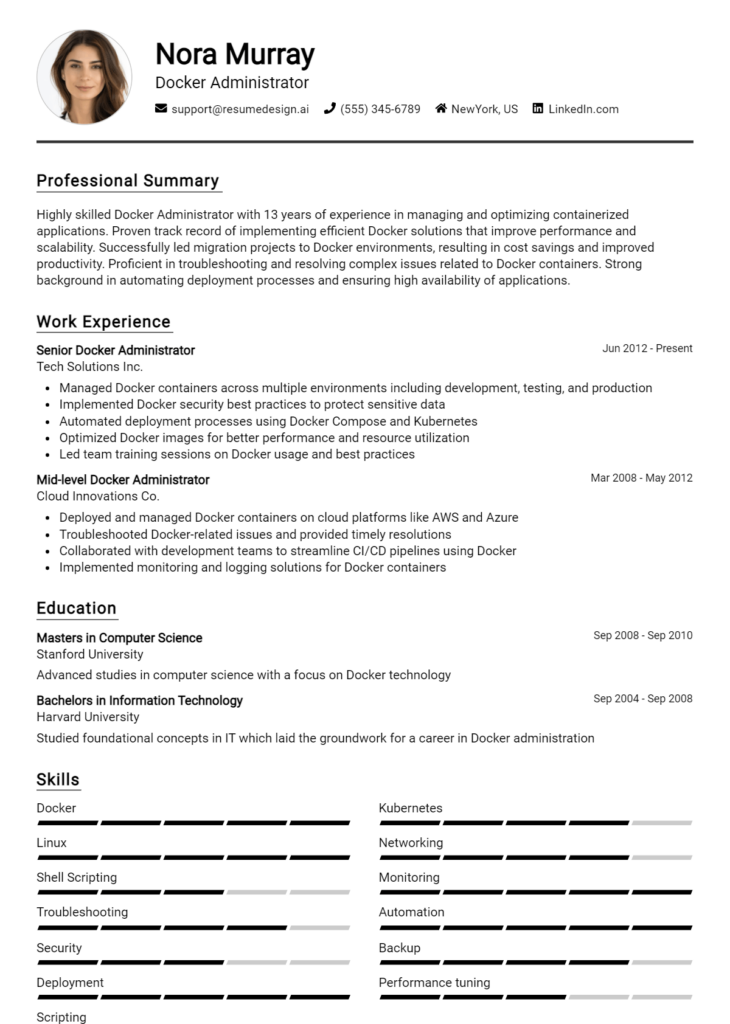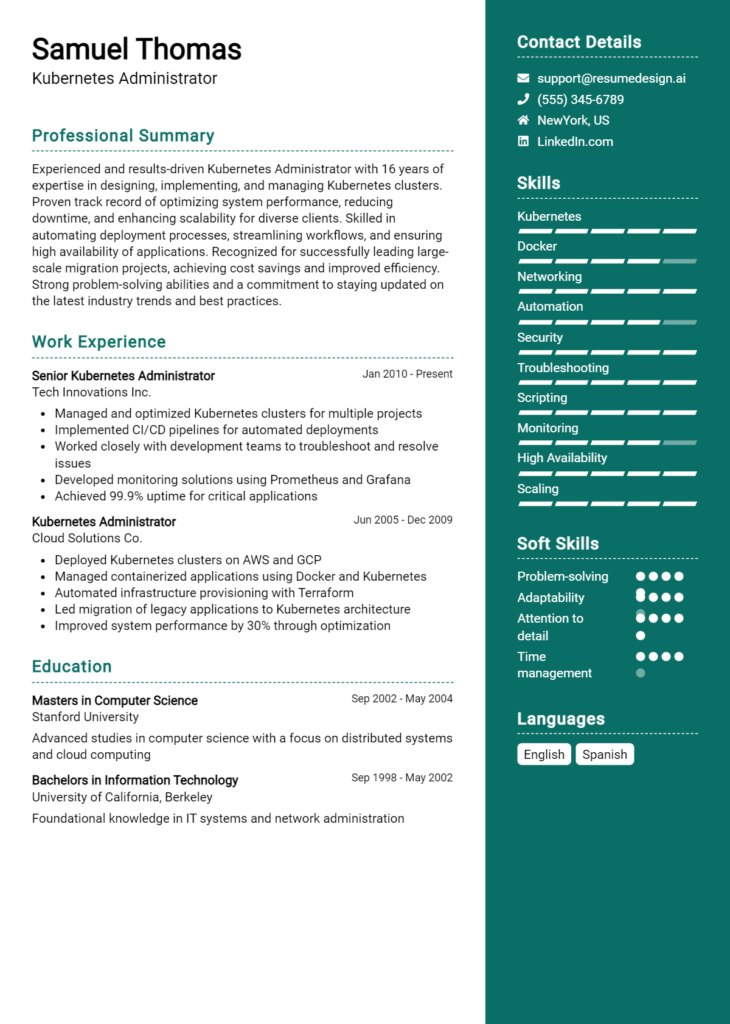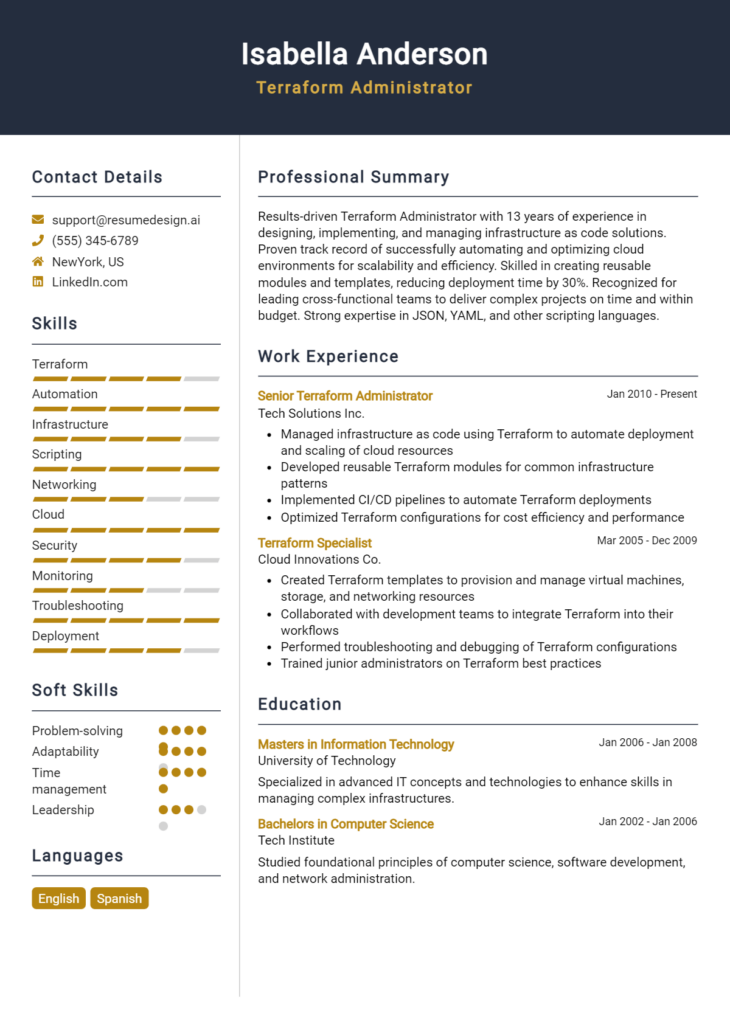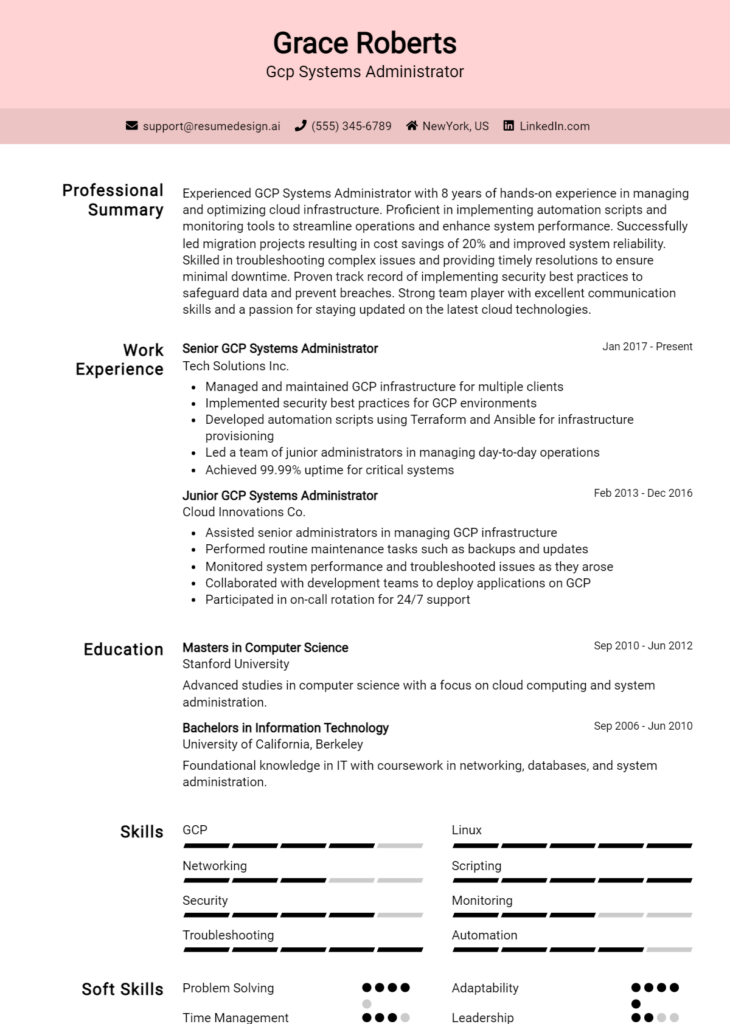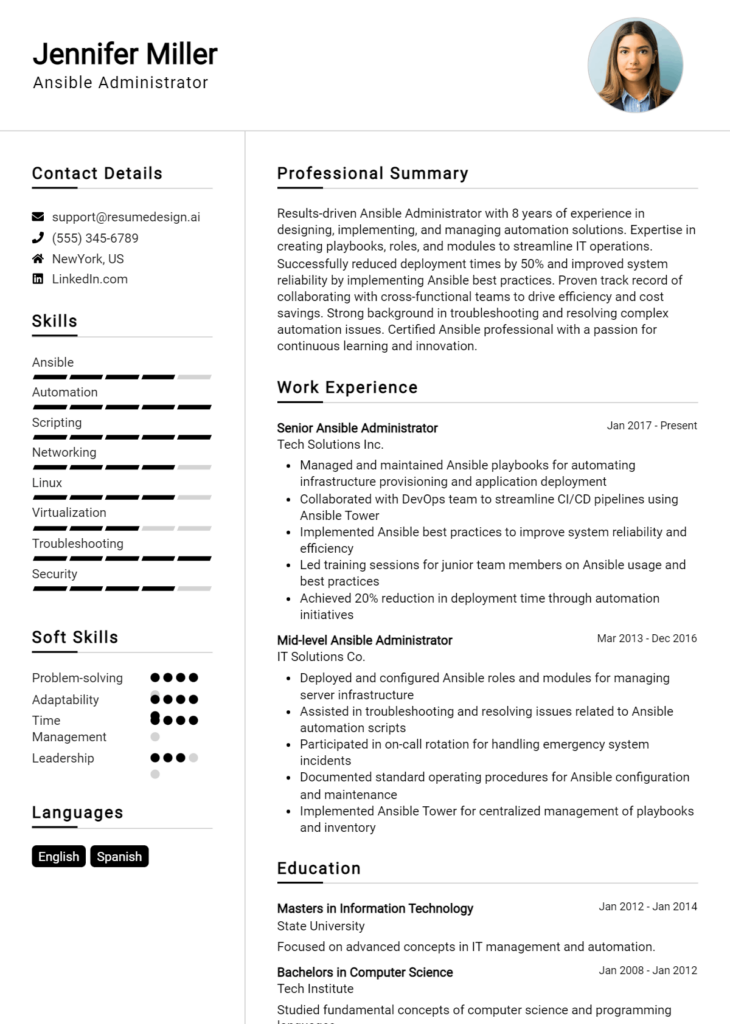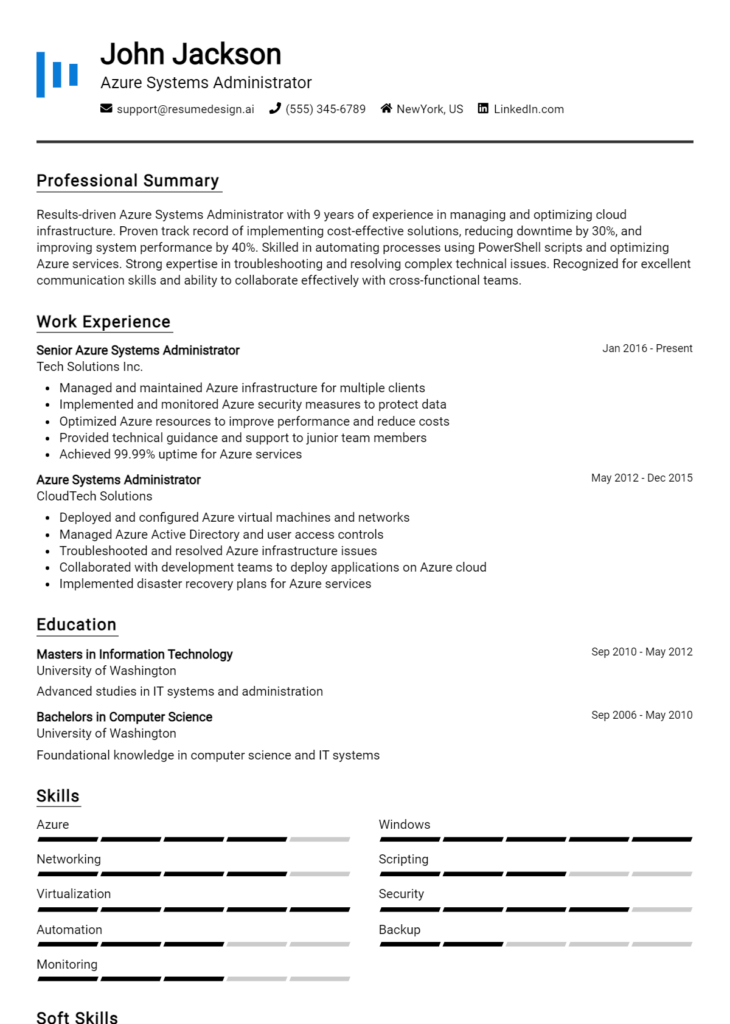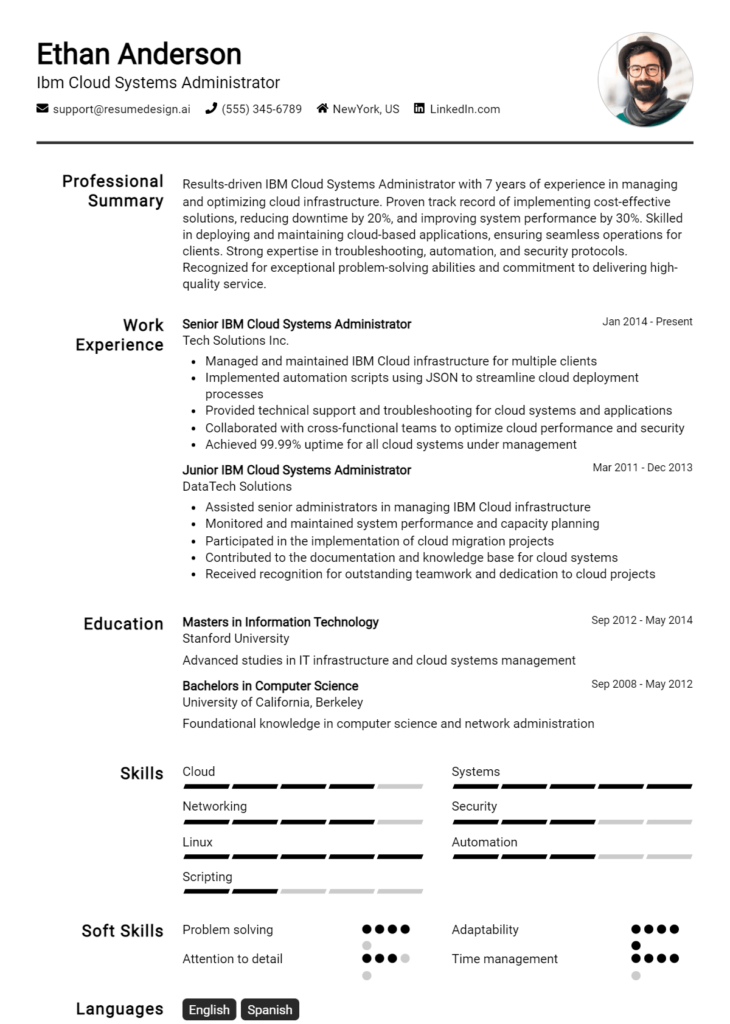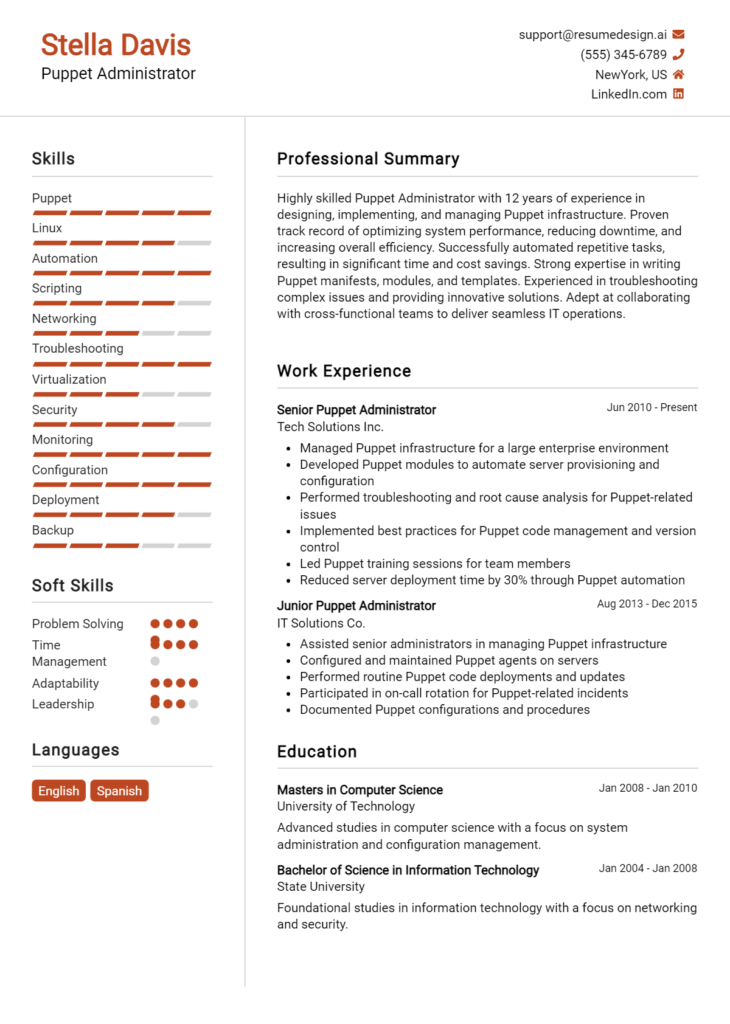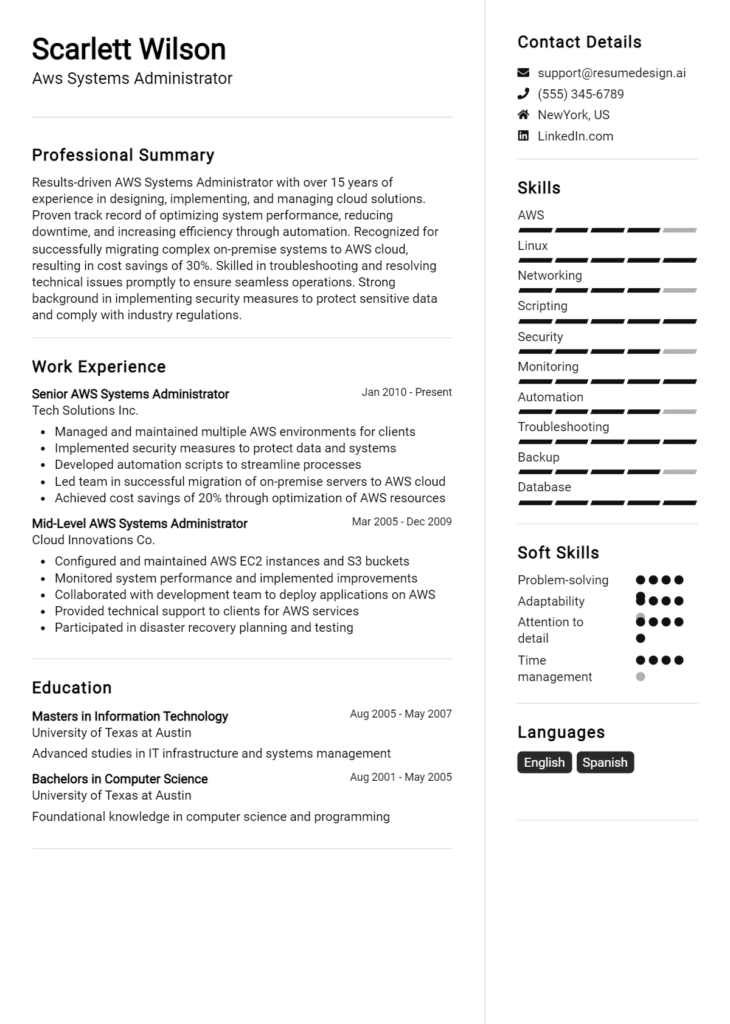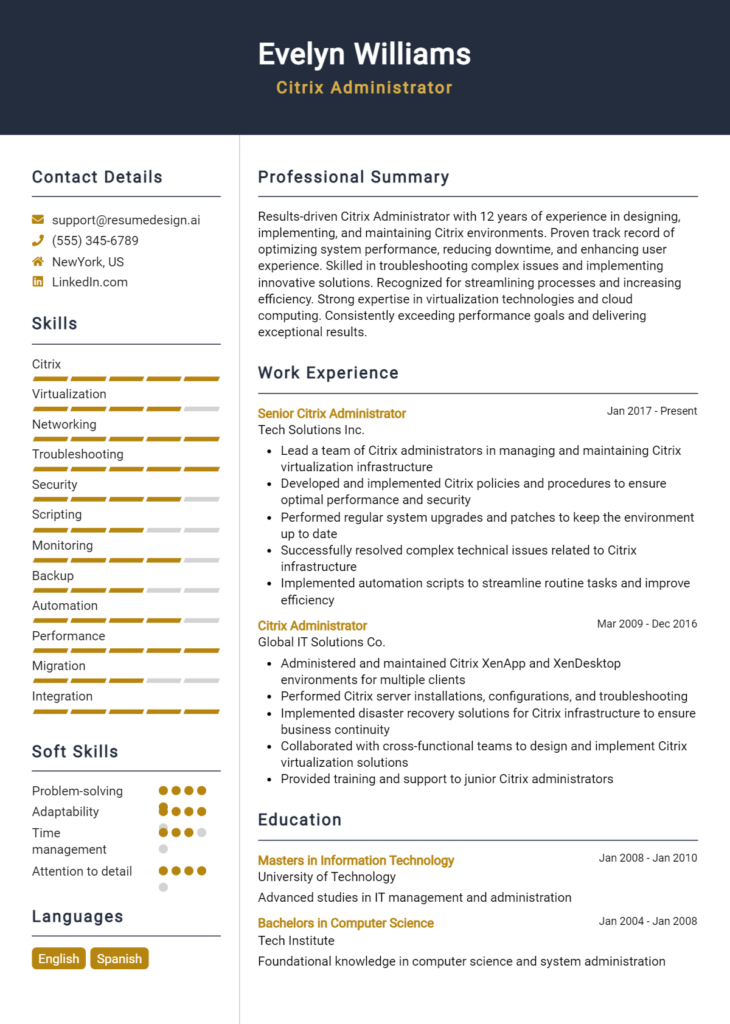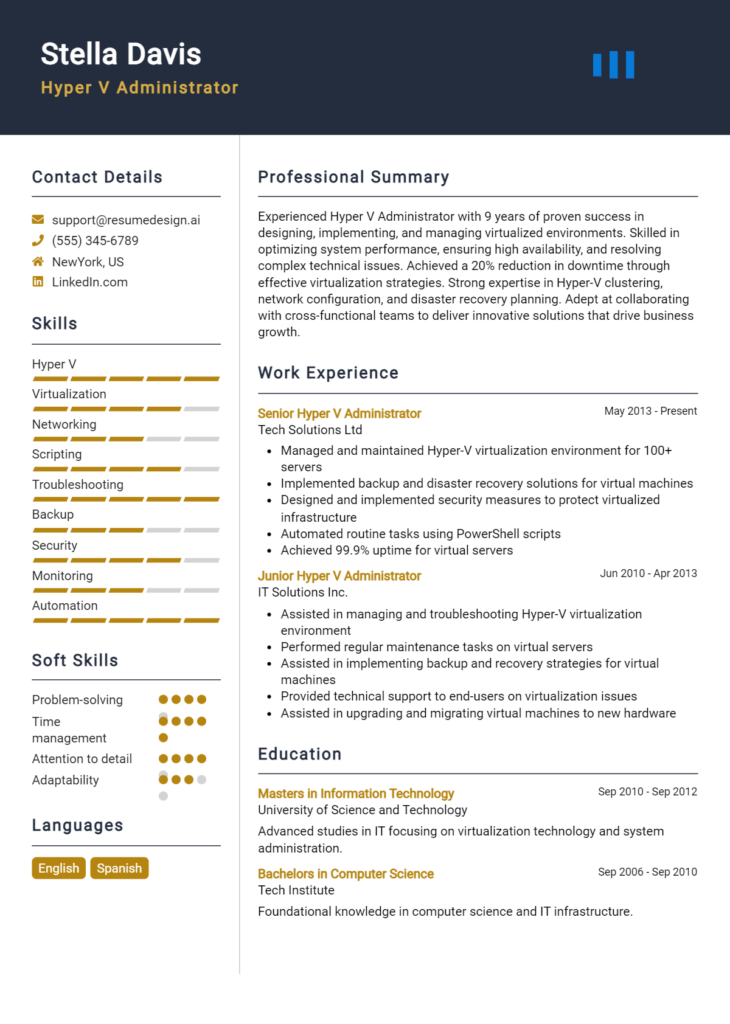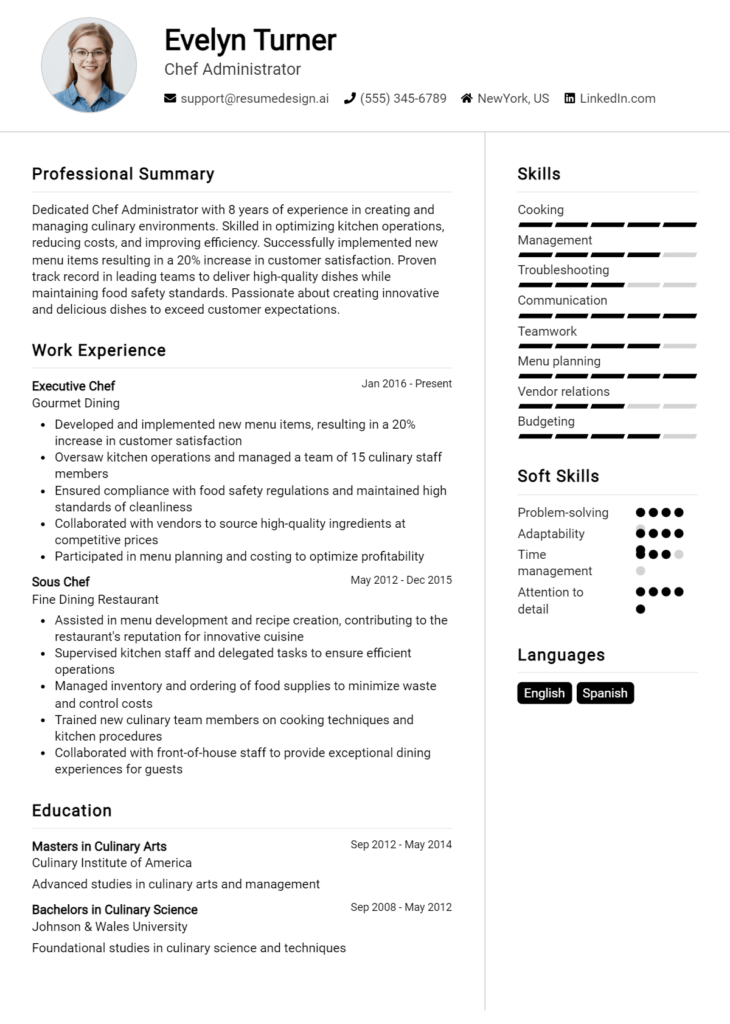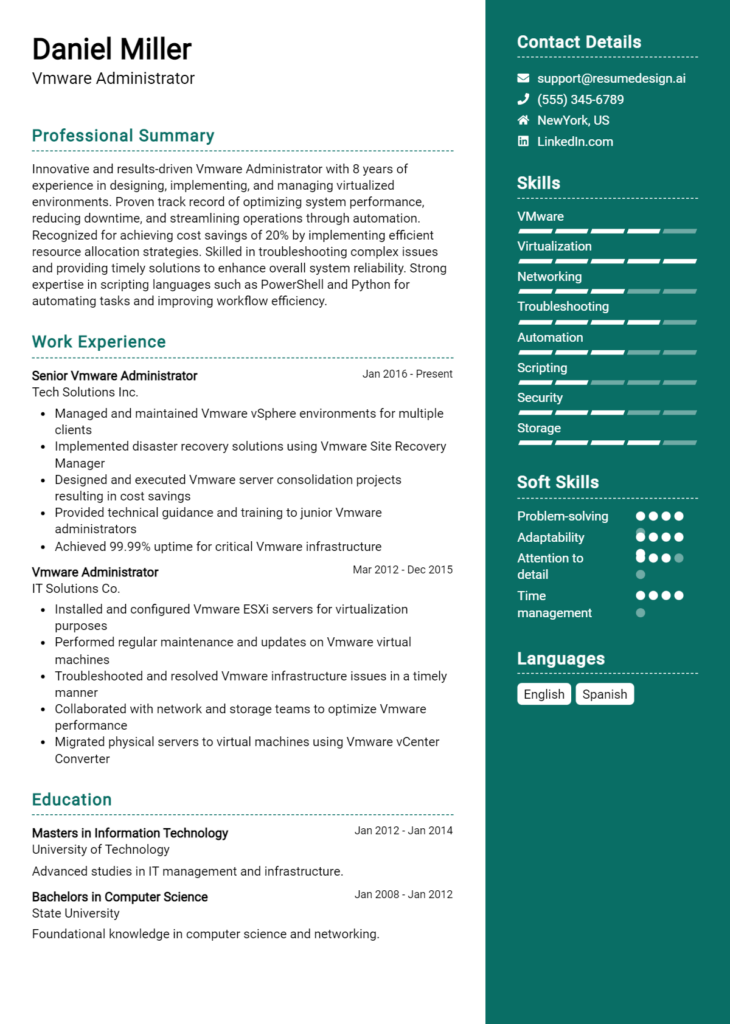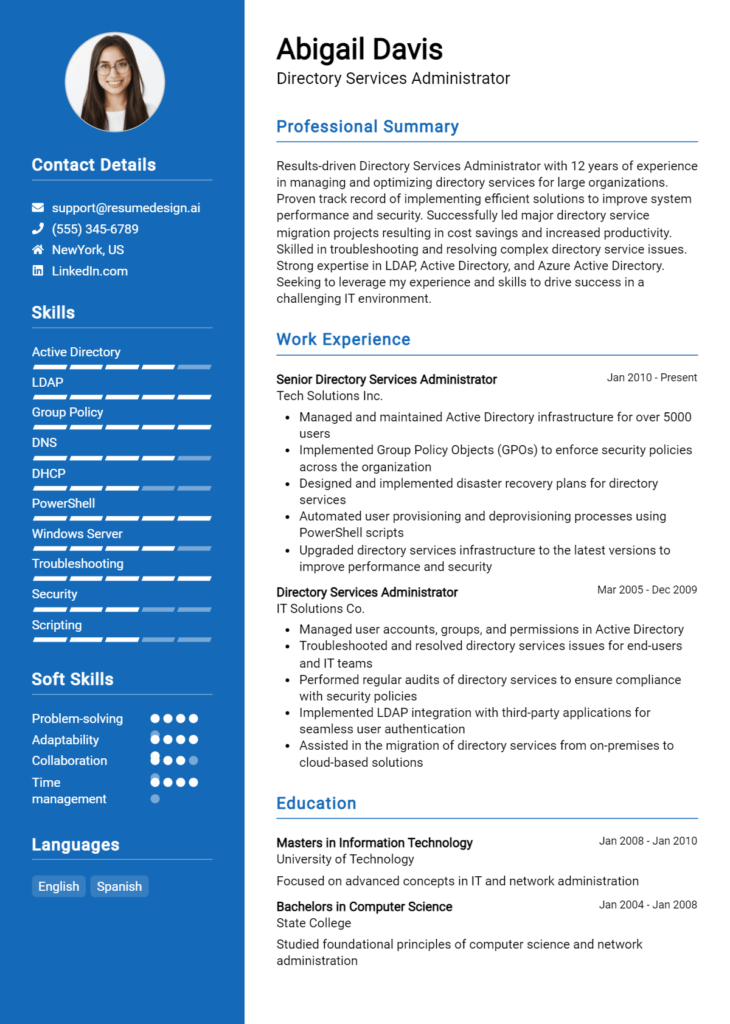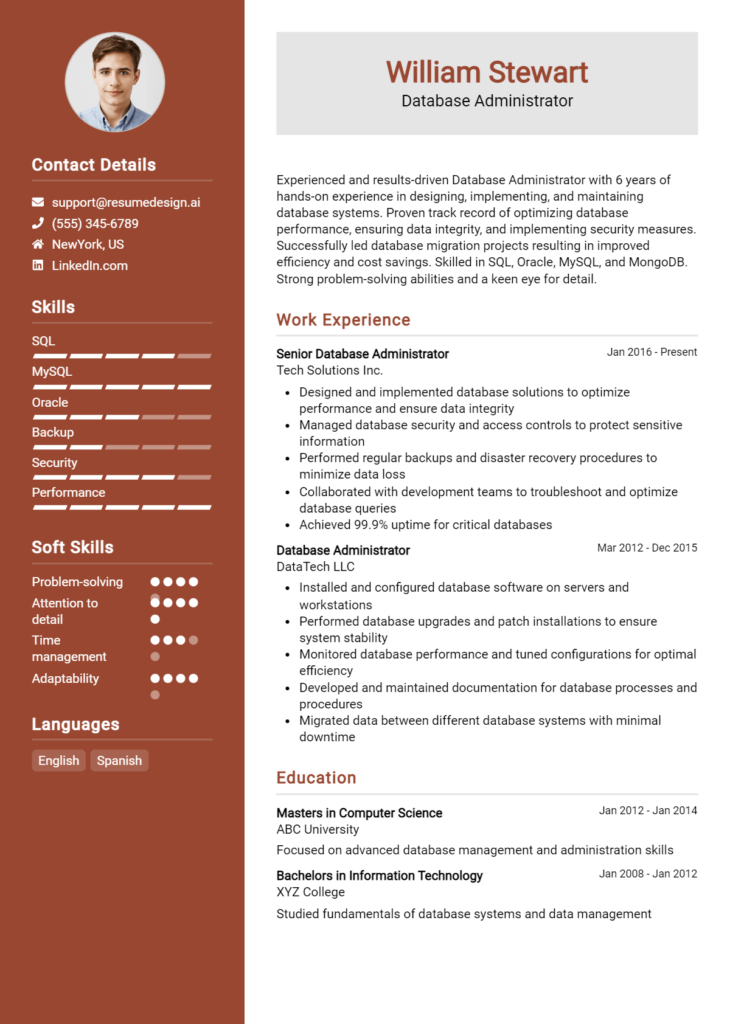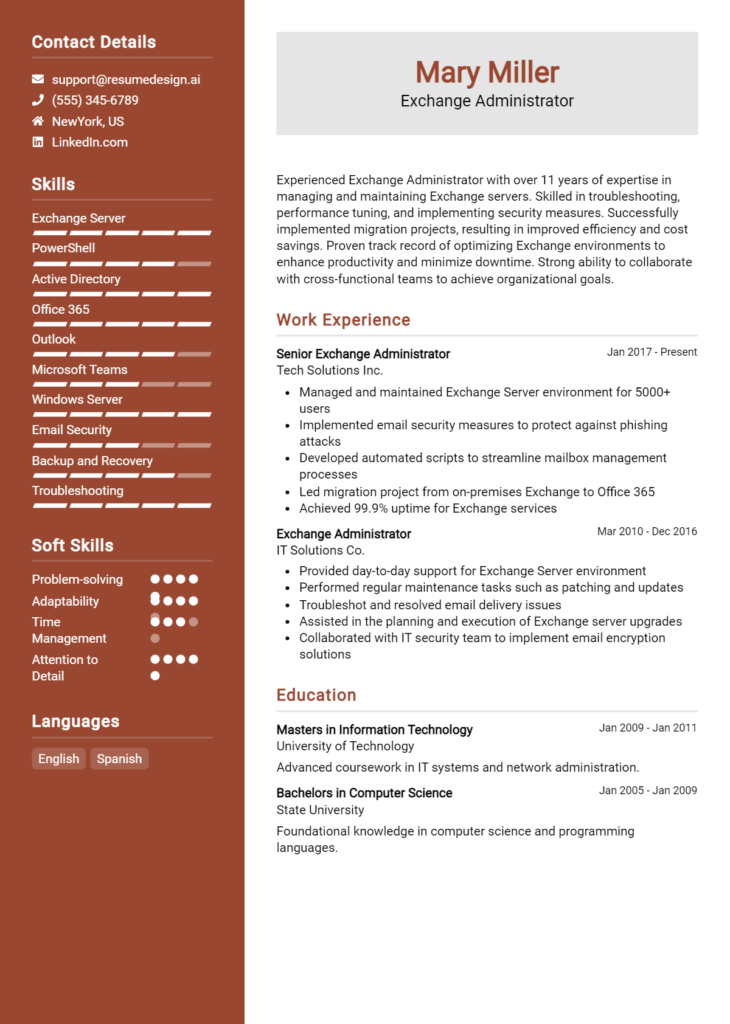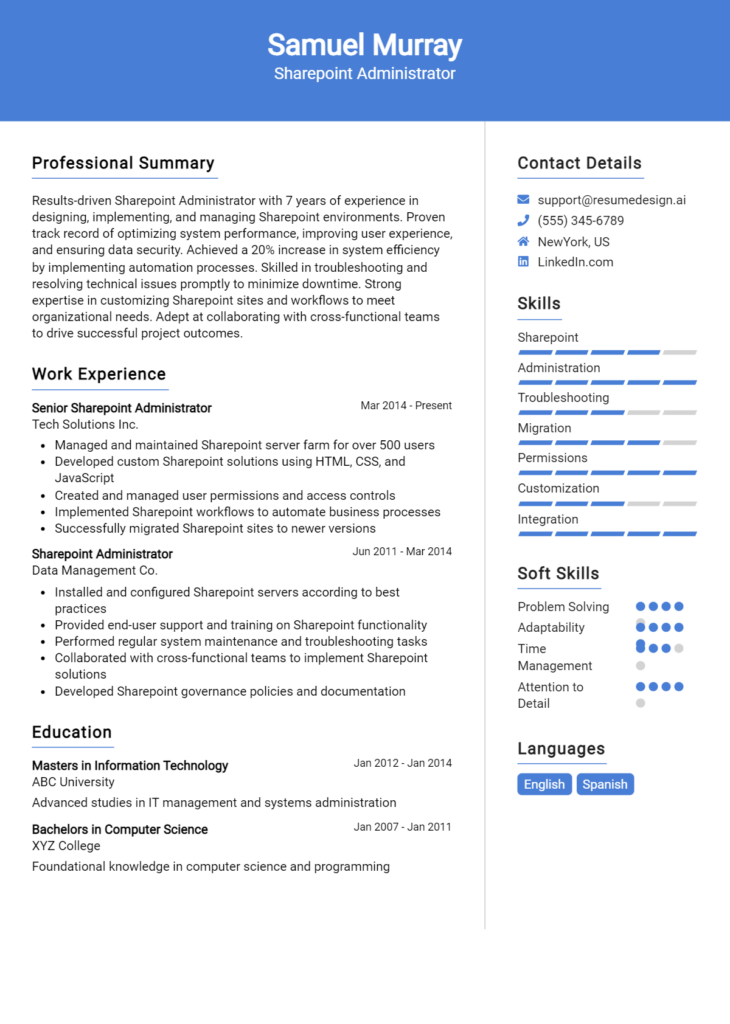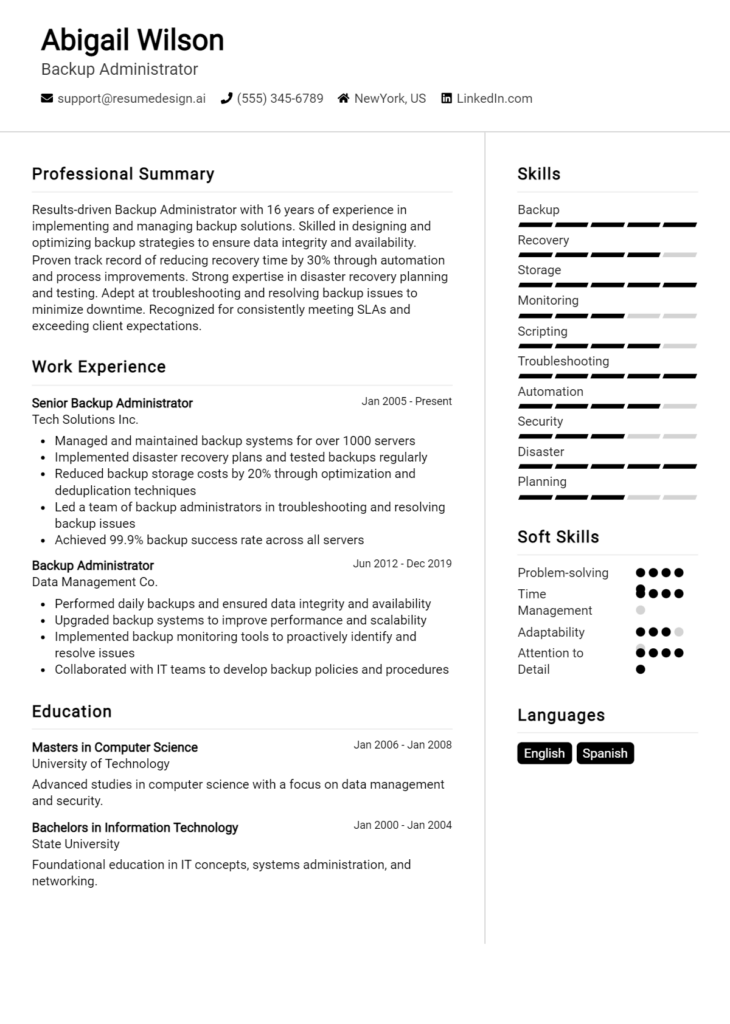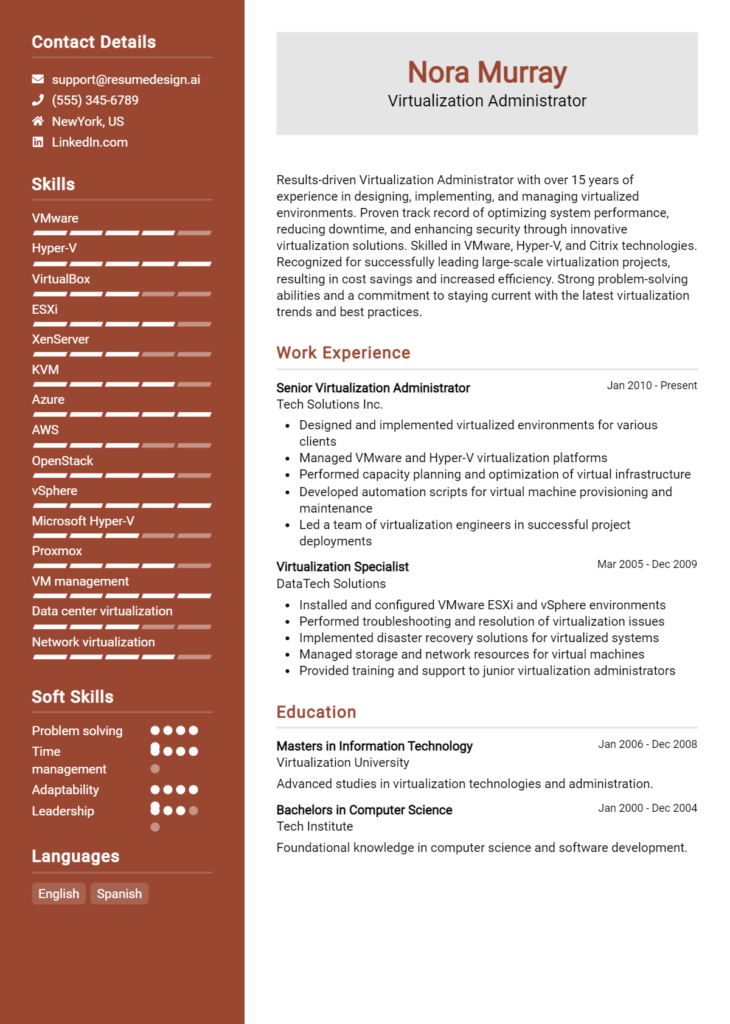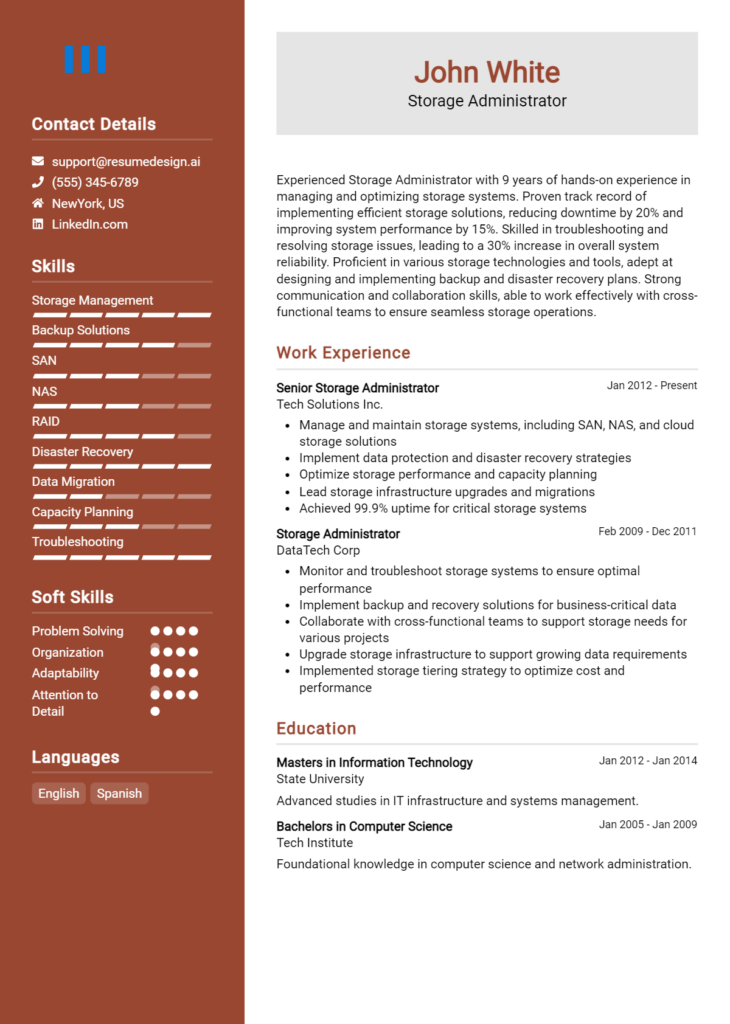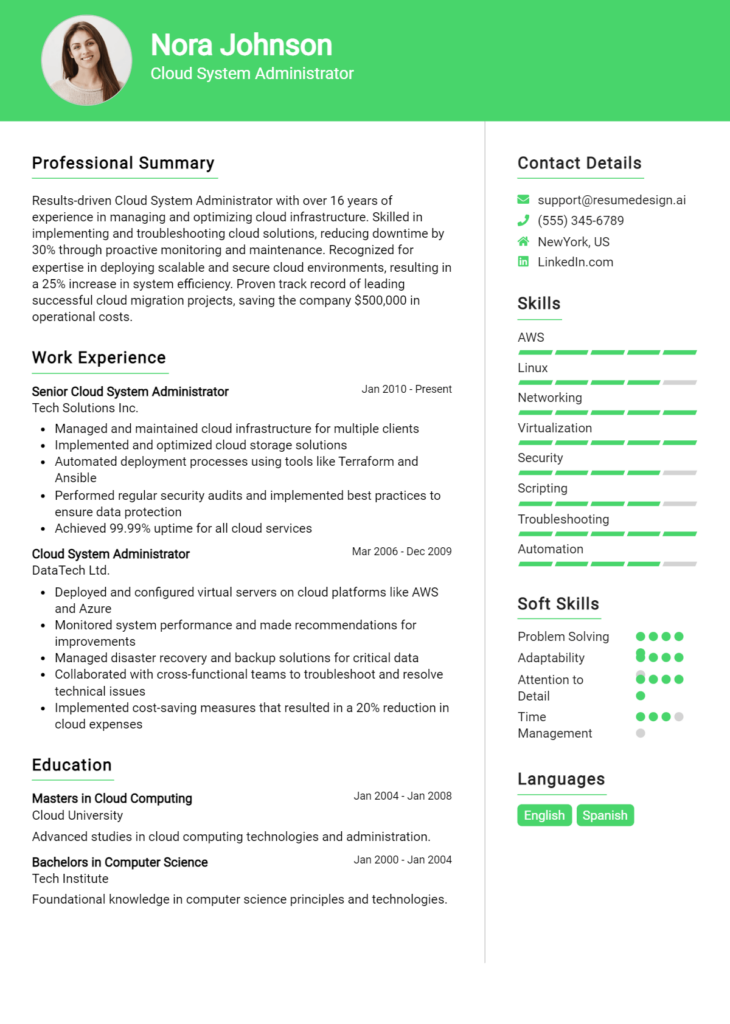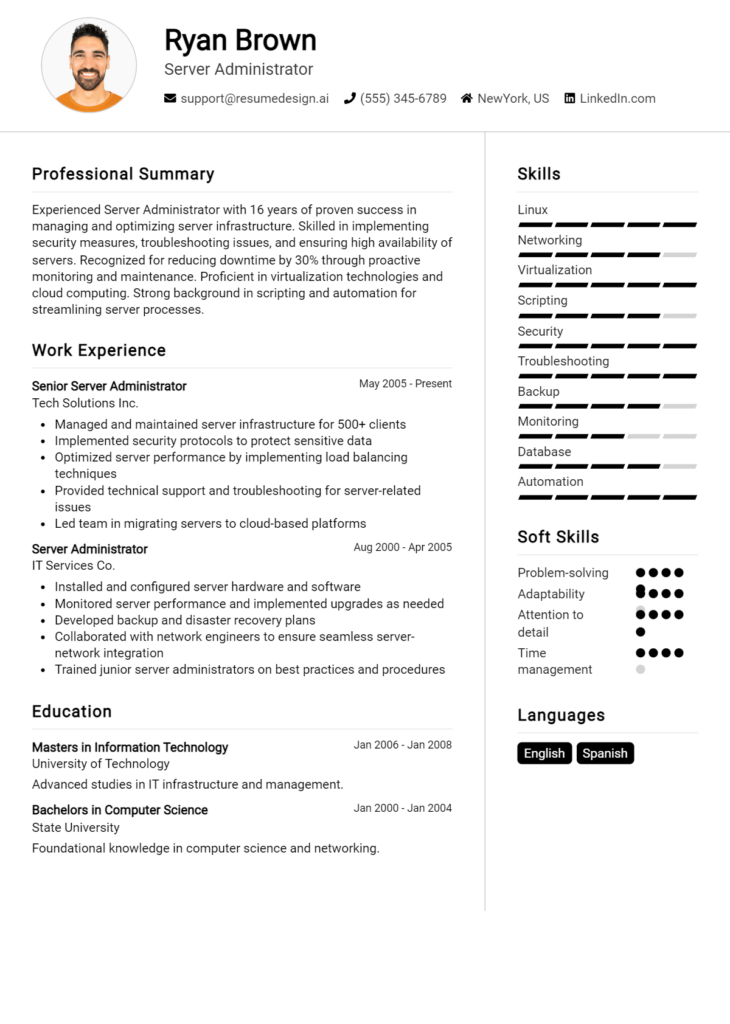System Administrator Core Responsibilities
A System Administrator plays a crucial role in an organization by ensuring the stability, security, and efficiency of its IT infrastructure. Key responsibilities include managing servers, networks, and applications while collaborating with various departments to meet their technical needs. Essential skills encompass technical expertise, operational management, and strong problem-solving abilities. These competencies are vital in achieving organizational goals, and a well-structured resume can effectively highlight these qualifications, showcasing a candidate’s readiness to support the business's success.
Common Responsibilities Listed on System Administrator Resume
- Monitor and maintain system performance and security.
- Install, configure, and upgrade server hardware and software.
- Manage user accounts and permissions in Active Directory.
- Troubleshoot and resolve hardware and software issues.
- Implement and manage backup and recovery solutions.
- Document system configurations and procedures.
- Ensure compliance with security policies and procedures.
- Collaborate with IT teams to deploy new technologies.
- Perform regular system audits and assessments.
- Provide technical support and training to users.
- Manage network infrastructure and connectivity.
- Evaluate and recommend new hardware and software solutions.
High-Level Resume Tips for System Administrator Professionals
In the competitive world of IT, where every detail counts, a well-crafted resume is not just a document; it's your first opportunity to make a lasting impression on potential employers. For System Administrator professionals, your resume must effectively showcase both your technical skills and your notable achievements. It serves as a marketing tool that highlights your ability to manage complex systems, troubleshoot issues, and provide critical support to an organization. This guide is designed to offer practical and actionable resume tips specifically tailored for System Administrator professionals, ensuring that your qualifications stand out in a crowded job market.
Top Resume Tips for System Administrator Professionals
- Tailor your resume to the job description by incorporating relevant keywords and phrases that align with the specific requirements of the position.
- Highlight your relevant experience in system administration, including specific technologies and platforms you have worked with, such as Linux, Windows Server, or cloud environments.
- Quantify your achievements wherever possible, using metrics to demonstrate the impact of your work, such as system uptime percentages, cost reductions, or efficiency improvements.
- Include industry-specific certifications, such as CompTIA Server+, Microsoft Certified: Azure Administrator Associate, or Cisco Certified Network Associate (CCNA), to enhance your credibility.
- Showcase your problem-solving skills by detailing complex issues you have resolved and the methodologies you used to address them.
- List your technical skills prominently, ensuring you cover both hard skills (like scripting languages and network protocols) and soft skills (such as communication and teamwork).
- Use a clean, professional format that is easy to read, ensuring that critical information is readily accessible to hiring managers.
- Keep your resume concise, ideally one page, while still providing enough detail to convey your capabilities and achievements.
- Incorporate a summary statement that encapsulates your experience, skills, and career goals, giving employers a snapshot of your professional identity.
By implementing these tips, you can significantly increase your chances of landing a job in the System Administrator field. A polished resume that effectively communicates your skills and accomplishments not only attracts the attention of hiring managers but also positions you as a qualified candidate ready to take on the challenges of maintaining and optimizing complex IT environments.
Why Resume Headlines & Titles are Important for System Administrator
In the competitive field of system administration, a well-crafted resume is essential for standing out among a sea of applicants. One key aspect of an effective resume is the use of headlines and titles, which serve as the first impression for hiring managers. A strong resume headline can capture attention quickly and summarize a candidate's key qualifications in one impactful phrase. This concise and relevant statement should directly relate to the job being applied for, conveying essential skills and experiences that align with the expectations of potential employers.
Best Practices for Crafting Resume Headlines for System Administrator
- Keep it concise: Aim for a headline that is no longer than one or two lines.
- Be role-specific: Tailor your headline to reflect the specific position of System Administrator.
- Highlight key skills: Include technical skills and certifications relevant to the role.
- Use impactful language: Choose strong action words to convey your expertise.
- Include years of experience: If applicable, mention your years of experience to establish credibility.
- Focus on achievements: Incorporate any notable accomplishments that demonstrate your capabilities.
- Avoid jargon: Use clear and straightforward language that is easy to understand.
- Revise for relevance: Ensure your headline aligns closely with the job description and company needs.
Example Resume Headlines for System Administrator
Strong Resume Headlines
"Certified System Administrator with 8+ Years of Experience in Network Management and Security"
"Results-Driven System Administrator Specializing in Cloud Infrastructure and Virtualization"
“Experienced IT Professional with Proven Track Record in System Optimization and Troubleshooting”
“Dynamic System Administrator with Expertise in Linux and Windows Server Environments”
Weak Resume Headlines
“System Administrator”
“IT Professional Looking for Opportunities”
“Experienced Worker in Technology”
The strong headlines are effective because they provide specific details about the candidate's qualifications, showcasing their expertise and relevant experience in system administration. They immediately communicate the value the candidate brings to the table, making them memorable to hiring managers. In contrast, the weak headlines are vague and lack specificity, failing to convey any compelling information about the candidate's skills or achievements. This can lead to the candidate being overlooked, as these generic titles do not differentiate them from other applicants.
Writing an Exceptional System Administrator Resume Summary
A well-crafted resume summary is crucial for a System Administrator as it serves as the first impression a hiring manager will have of a candidate. This brief yet powerful section quickly captures attention by highlighting key skills, relevant experience, and notable accomplishments that align with the job role. An impactful summary should be concise, directly addressing the specific requirements of the position being applied for, thereby setting the tone for the rest of the resume and increasing the candidate's chances of moving forward in the hiring process.
Best Practices for Writing a System Administrator Resume Summary
- Quantify achievements: Use numbers and metrics to demonstrate the impact of your work.
- Focus on relevant skills: Highlight specific technical and soft skills that are pertinent to the job description.
- Tailor the summary: Customize your summary to match the requirements and keywords of the job you are applying for.
- Be concise: Aim for 3-5 sentences that are straightforward and to the point.
- Use active language: Start sentences with strong action verbs to convey confidence and capability.
- Highlight certifications: Mention any relevant certifications or training that enhance your qualifications.
- Showcase problem-solving abilities: Emphasize your capacity to troubleshoot and resolve issues effectively.
- Include industry experience: Reference the number of years you’ve worked in the field to establish credibility.
Example System Administrator Resume Summaries
Strong Resume Summaries
Results-driven System Administrator with over 5 years of experience in managing and optimizing enterprise-level systems. Successfully reduced downtime by 30% through proactive monitoring and maintenance, ensuring high availability for critical applications.
Dedicated IT professional with extensive expertise in network security and data integrity. Achieved a 40% decrease in security breaches by implementing robust firewall protocols and regular system audits.
Skilled System Administrator with a proven track record in cloud migration and infrastructure management. Led a project that transitioned 200+ users to a cloud-based system ahead of schedule, improving operational efficiency by 25%.
Versatile System Administrator experienced in both Windows and Linux environments. Successfully enhanced server performance by 50% through system optimization and automation scripts, resulting in improved user satisfaction.
Weak Resume Summaries
Experienced System Administrator looking for new opportunities in IT. I am good at troubleshooting and managing systems.
System Administrator with knowledge of various technologies. I have worked in IT for several years and can help with problems.
The strong resume summaries are considered effective because they provide specific, quantifiable achievements and directly relate to the responsibilities of a System Administrator. They highlight relevant skills and experiences that showcase the candidate's ability to make a significant impact. In contrast, the weak summaries lack detail and specificity, making them feel generic and unconvincing. They do not effectively convey the candidate's qualifications or the unique value they can bring to the employer.
Work Experience Section for System Administrator Resume
The work experience section of a System Administrator resume is crucial as it provides a comprehensive view of a candidate's technical capabilities, leadership skills, and the quality of work delivered in previous roles. This section allows candidates to showcase their expertise in managing complex systems, troubleshooting issues, and ensuring the reliability of IT infrastructure. Additionally, it highlights their ability to collaborate with teams and stakeholders to drive projects to completion. Quantifying achievements, such as system uptime improvements or cost reductions, and aligning experiences with industry standards is essential for making a strong impression on potential employers.
Best Practices for System Administrator Work Experience
- Use specific technical terminology relevant to system administration to demonstrate expertise.
- Quantify achievements with metrics such as uptime percentage, response time improvements, or cost savings.
- Highlight leadership roles and teamwork experiences to show ability to manage and collaborate with teams.
- Align your experience with industry standards and best practices to demonstrate knowledge of current trends.
- Tailor your work experience descriptions to match the requirements of the job you’re applying for.
- Include relevant certifications and training that complement your practical experience.
- Use action verbs to start bullet points, showcasing your proactive approach to tasks.
- Provide context for your achievements by including the challenges faced and solutions implemented.
Example Work Experiences for System Administrator
Strong Experiences
- Led a team of 5 system administrators to achieve a 99.9% system uptime over three consecutive years through proactive monitoring and maintenance.
- Implemented a new backup solution that reduced data recovery time by 40%, ensuring business continuity during system outages.
- Coordinated cross-departmental training sessions, resulting in a 30% increase in team productivity and a significant reduction in support tickets.
- Managed a $200,000 IT infrastructure project, delivering it 10% under budget and two weeks ahead of schedule.
Weak Experiences
- Responsible for system administration tasks.
- Worked with a team to fix some issues.
- Ensured systems were running smoothly.
- Participated in various IT projects.
The examples listed above are considered strong because they contain specific metrics, demonstrate clear leadership, and highlight collaboration and problem-solving abilities within a team setting. In contrast, the weak experiences lack detail, measurable outcomes, and do not effectively communicate the candidate's contributions or impact, making it difficult for potential employers to gauge their qualifications.
Education and Certifications Section for System Administrator Resume
The education and certifications section of a System Administrator resume is crucial as it provides a comprehensive overview of the candidate's academic background and professional qualifications. This section not only showcases the formal education that underpins the candidate's technical skills but also highlights industry-relevant certifications that demonstrate expertise and commitment to continuous learning. By including relevant coursework, recognized certifications, and specialized training, candidates can significantly enhance their credibility and better align themselves with the specific demands of the job role. A well-structured education and certifications section can set a candidate apart in a competitive job market, signaling to employers that they possess the necessary knowledge and skills to excel as a System Administrator.
Best Practices for System Administrator Education and Certifications
- List only relevant degrees and certifications that pertain to system administration.
- Include the full name of certifications along with the issuing organization (e.g., CompTIA, Microsoft).
- Highlight advanced certifications that demonstrate a higher level of expertise, such as CISSP or CCNA.
- Detail relevant coursework that pertains directly to systems management, networking, or security.
- Be specific about the dates of graduation and certification achievement to show currency.
- Consider including any ongoing education efforts, such as online courses or workshops.
- Use a clear and organized format that makes it easy for employers to quickly assess qualifications.
- Tailor the content to match the job description, emphasizing certifications that are specifically mentioned.
Example Education and Certifications for System Administrator
Strong Examples
- Bachelor of Science in Information Technology, XYZ University, Graduated May 2021
- CompTIA Security+ Certification, Issued July 2022
- Microsoft Certified: Azure Administrator Associate, Issued March 2023
- Coursework: Network Administration, Systems Security, and Virtualization Technologies
Weak Examples
- Associate Degree in General Studies, ABC Community College, Graduated May 2019
- Certified Microsoft Office Specialist, Issued January 2020
- Certificate in Basic Computer Skills, Issued December 2018
- Coursework: Introduction to Art and History
The examples provided are considered strong because they directly relate to the skills and knowledge required for a System Administrator role, showcasing relevant degrees and certifications that enhance the candidate's qualifications. In contrast, the weak examples highlight irrelevant or outdated qualifications that do not align with the expectations of the position, such as a general studies degree or basic computer skills certification, which fail to demonstrate the necessary technical expertise and focus required in system administration.
Top Skills & Keywords for System Administrator Resume
A well-crafted resume is crucial for a System Administrator, as it serves as the first impression to potential employers. Highlighting the right skills is essential, as they demonstrate your ability to manage and maintain an organization’s IT infrastructure effectively. Potential employers look for a blend of technical expertise and interpersonal abilities, which can set you apart from other candidates. By emphasizing both hard and soft skills in your resume, you can showcase your comprehensive skill set and readiness to tackle the challenges of a System Administrator role. For a deeper understanding of how to enhance your resume with relevant skills, check out this detailed guide on skills and explore how to effectively present your work experience.
Top Hard & Soft Skills for System Administrator
Soft Skills
- Problem-solving
- Communication
- Time management
- Adaptability
- Team collaboration
- Attention to detail
- Customer service orientation
- Critical thinking
- Conflict resolution
- Project management
Hard Skills
- Network configuration and management
- Operating system administration (Windows, Linux, macOS)
- Virtualization technologies (VMware, Hyper-V)
- Backup and disaster recovery solutions
- Security protocols and firewalls
- Scripting languages (Python, Bash, PowerShell)
- Database management (SQL, Oracle)
- Cloud services (AWS, Azure, Google Cloud)
- ITIL framework knowledge
- Monitoring and performance tuning tools
Stand Out with a Winning System Administrator Cover Letter
Dear [Hiring Manager's Name],
I am writing to express my interest in the System Administrator position at [Company Name] as advertised on [Job Board/Company Website]. With over [X years] of experience in managing and maintaining diverse IT infrastructures, I am confident in my ability to contribute effectively to your team. My background includes expertise in system configuration, network management, and troubleshooting, all of which have equipped me to handle the challenges that arise in dynamic environments like yours.
In my previous role at [Previous Company Name], I successfully managed a range of systems and applications, ensuring optimal performance and security. I implemented automated monitoring solutions that reduced downtime by [X%], allowing for seamless operation across departments. Additionally, my strong understanding of cloud technologies and virtualization has enabled me to streamline processes, enhance collaboration, and significantly reduce operational costs. I am particularly drawn to [Company Name] because of your commitment to innovation and your focus on leveraging technology to drive business success.
I am also adept at communicating complex technical concepts to non-technical stakeholders, fostering collaboration across teams. I believe that my proactive approach to problem-solving and my dedication to achieving excellence will make me a valuable addition to your organization. I am excited about the opportunity to leverage my skills in a challenging role at [Company Name] and contribute to your mission of [specific company goal or value].
Thank you for considering my application. I look forward to the opportunity to discuss how my experience and vision align with the goals of your team. Please feel free to contact me at [Your Phone Number] or [Your Email Address] to arrange a conversation.
Sincerely,
[Your Name]
[Your LinkedIn Profile or Website, if applicable]
Common Mistakes to Avoid in a System Administrator Resume
A well-crafted resume is crucial for a System Administrator, as it serves as the first impression to potential employers. However, many candidates make common mistakes that can undermine their chances of landing an interview. Understanding these pitfalls can help you create a more effective and professional resume that showcases your skills and experience. Below are some of the common mistakes to avoid:
Vague Job Descriptions: Failing to provide specific details about your responsibilities can leave employers unclear about your capabilities. Use quantifiable achievements to highlight your contributions.
Ignoring Keywords: Many companies use Applicant Tracking Systems (ATS) to screen resumes. Not incorporating relevant keywords from the job description can result in your resume being filtered out.
Overloading with Technical Jargon: While technical skills are important, excessive jargon can alienate hiring managers who may not be familiar with every term. Aim for clarity and balance in your language.
Lack of Focus on Soft Skills: System Administrators need strong communication and problem-solving abilities. Neglecting to mention these skills can give a one-dimensional view of your qualifications.
Using an Unprofessional Email Address: An email address that is not professional can lead to a negative impression. Opt for a simple combination of your first and last name.
Omitting Certifications: Relevant certifications, such as CompTIA or Microsoft certifications, are essential to showcase your qualifications. Ensure they are prominently featured on your resume.
Too Much Information: Including irrelevant work experience or outdated skills can dilute the impact of your resume. Focus on the most pertinent information that aligns with the job.
Neglecting Formatting: A cluttered or disorganized resume can be difficult to read. Use consistent formatting, bullet points, and headings to enhance readability and make a positive impression.
Conclusion
As a System Administrator, your role is crucial in maintaining the integrity and efficiency of an organization's IT infrastructure. You oversee network operations, implement security measures, and ensure system availability, which requires a diverse skill set ranging from technical expertise to problem-solving abilities. Highlighting your experience with server management, cloud technologies, and troubleshooting in your resume will make you stand out to potential employers.
In today's competitive job market, it's essential to present your qualifications effectively. A well-crafted resume tailored to the specific demands of the System Administrator position can significantly enhance your chances of landing an interview. Remember to focus on your achievements, certifications, and relevant technical skills that reflect your capability to manage and optimize IT systems.
With that in mind, now is the perfect time to review and update your System Administrator resume. Utilize available resources to help you create a standout application. Check out resume templates for a professional layout, use the resume builder for easy customization, explore resume examples for inspiration, and don't forget to craft a compelling introduction with cover letter templates. Take action today to ensure your resume reflects your qualifications and makes a lasting impression on hiring managers!

